BCO6603 ERP Systems Report: On-Premise, Hosted, Cloud Comparison
VerifiedAdded on 2023/04/21
|21
|5766
|244
Report
AI Summary
This report provides a comprehensive analysis of Enterprise Resource Planning (ERP) systems, comparing on-premise, hosted, and cloud-based solutions. It begins with an introduction to ERP, outlining its role in business process management and automation. The report then delves into the specifics of each ERP type, defining on-premise, hosted, and cloud ERP systems and detailing their functionalities. Case studies are used to illustrate the practical application of each ERP model, including a specific example of an on-premise implementation. The report thoroughly discusses the advantages and disadvantages of each ERP system type, covering aspects like data control, vendor dependency, customization options, and cost considerations. It also addresses the impact of cloud computing on ERP, including public, private, and hybrid cloud models. Overall, the report aims to provide a detailed overview of the different ERP options, helping businesses make informed decisions about which system best suits their needs.

Running head: ENTERPRISE RESOURCE PLANNING
Enterprise Resource Planning
[Name of the Student]
[Name of the University]
[Author note]
Enterprise Resource Planning
[Name of the Student]
[Name of the University]
[Author note]
Paraphrase This Document
Need a fresh take? Get an instant paraphrase of this document with our AI Paraphraser
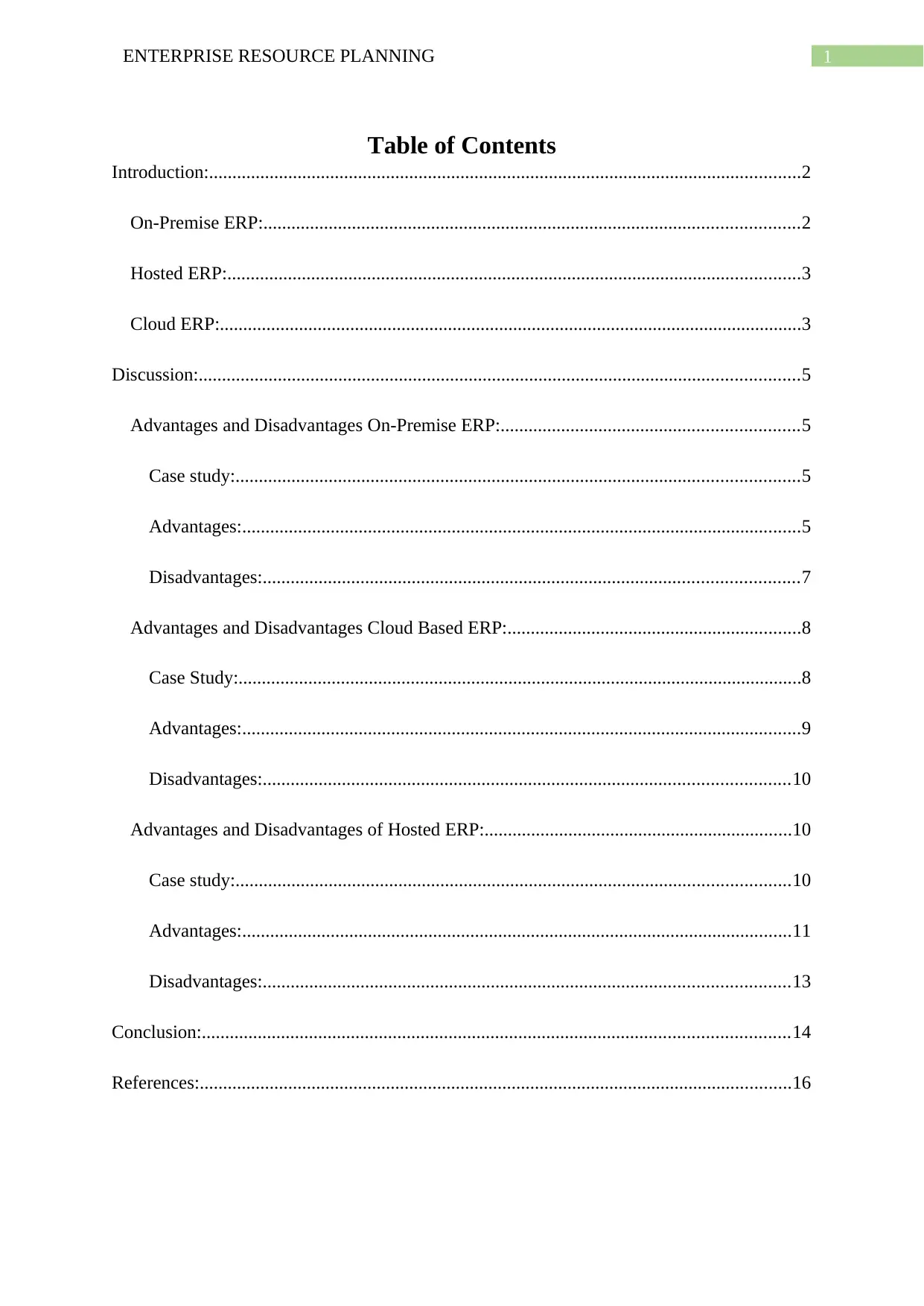
1ENTERPRISE RESOURCE PLANNING
Table of Contents
Introduction:...............................................................................................................................2
On-Premise ERP:...................................................................................................................2
Hosted ERP:...........................................................................................................................3
Cloud ERP:.............................................................................................................................3
Discussion:.................................................................................................................................5
Advantages and Disadvantages On-Premise ERP:................................................................5
Case study:.........................................................................................................................5
Advantages:........................................................................................................................5
Disadvantages:...................................................................................................................7
Advantages and Disadvantages Cloud Based ERP:...............................................................8
Case Study:.........................................................................................................................8
Advantages:........................................................................................................................9
Disadvantages:.................................................................................................................10
Advantages and Disadvantages of Hosted ERP:..................................................................10
Case study:.......................................................................................................................10
Advantages:......................................................................................................................11
Disadvantages:.................................................................................................................13
Conclusion:..............................................................................................................................14
References:...............................................................................................................................16
Table of Contents
Introduction:...............................................................................................................................2
On-Premise ERP:...................................................................................................................2
Hosted ERP:...........................................................................................................................3
Cloud ERP:.............................................................................................................................3
Discussion:.................................................................................................................................5
Advantages and Disadvantages On-Premise ERP:................................................................5
Case study:.........................................................................................................................5
Advantages:........................................................................................................................5
Disadvantages:...................................................................................................................7
Advantages and Disadvantages Cloud Based ERP:...............................................................8
Case Study:.........................................................................................................................8
Advantages:........................................................................................................................9
Disadvantages:.................................................................................................................10
Advantages and Disadvantages of Hosted ERP:..................................................................10
Case study:.......................................................................................................................10
Advantages:......................................................................................................................11
Disadvantages:.................................................................................................................13
Conclusion:..............................................................................................................................14
References:...............................................................................................................................16

2ENTERPRISE RESOURCE PLANNING
⊘ This is a preview!⊘
Do you want full access?
Subscribe today to unlock all pages.

Trusted by 1+ million students worldwide
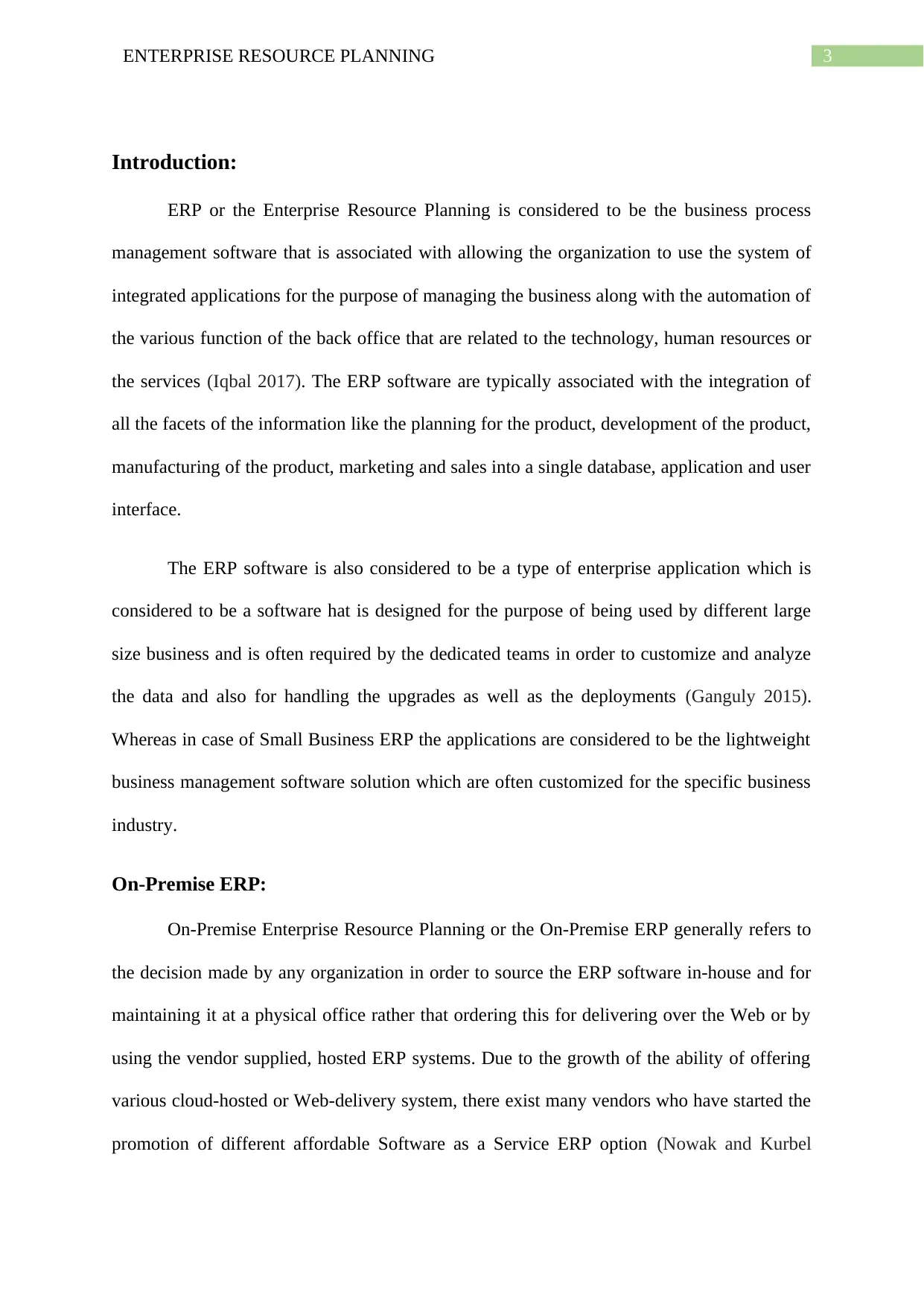
3ENTERPRISE RESOURCE PLANNING
Introduction:
ERP or the Enterprise Resource Planning is considered to be the business process
management software that is associated with allowing the organization to use the system of
integrated applications for the purpose of managing the business along with the automation of
the various function of the back office that are related to the technology, human resources or
the services (Iqbal 2017). The ERP software are typically associated with the integration of
all the facets of the information like the planning for the product, development of the product,
manufacturing of the product, marketing and sales into a single database, application and user
interface.
The ERP software is also considered to be a type of enterprise application which is
considered to be a software hat is designed for the purpose of being used by different large
size business and is often required by the dedicated teams in order to customize and analyze
the data and also for handling the upgrades as well as the deployments (Ganguly 2015).
Whereas in case of Small Business ERP the applications are considered to be the lightweight
business management software solution which are often customized for the specific business
industry.
On-Premise ERP:
On-Premise Enterprise Resource Planning or the On-Premise ERP generally refers to
the decision made by any organization in order to source the ERP software in-house and for
maintaining it at a physical office rather that ordering this for delivering over the Web or by
using the vendor supplied, hosted ERP systems. Due to the growth of the ability of offering
various cloud-hosted or Web-delivery system, there exist many vendors who have started the
promotion of different affordable Software as a Service ERP option (Nowak and Kurbel
Introduction:
ERP or the Enterprise Resource Planning is considered to be the business process
management software that is associated with allowing the organization to use the system of
integrated applications for the purpose of managing the business along with the automation of
the various function of the back office that are related to the technology, human resources or
the services (Iqbal 2017). The ERP software are typically associated with the integration of
all the facets of the information like the planning for the product, development of the product,
manufacturing of the product, marketing and sales into a single database, application and user
interface.
The ERP software is also considered to be a type of enterprise application which is
considered to be a software hat is designed for the purpose of being used by different large
size business and is often required by the dedicated teams in order to customize and analyze
the data and also for handling the upgrades as well as the deployments (Ganguly 2015).
Whereas in case of Small Business ERP the applications are considered to be the lightweight
business management software solution which are often customized for the specific business
industry.
On-Premise ERP:
On-Premise Enterprise Resource Planning or the On-Premise ERP generally refers to
the decision made by any organization in order to source the ERP software in-house and for
maintaining it at a physical office rather that ordering this for delivering over the Web or by
using the vendor supplied, hosted ERP systems. Due to the growth of the ability of offering
various cloud-hosted or Web-delivery system, there exist many vendors who have started the
promotion of different affordable Software as a Service ERP option (Nowak and Kurbel
Paraphrase This Document
Need a fresh take? Get an instant paraphrase of this document with our AI Paraphraser
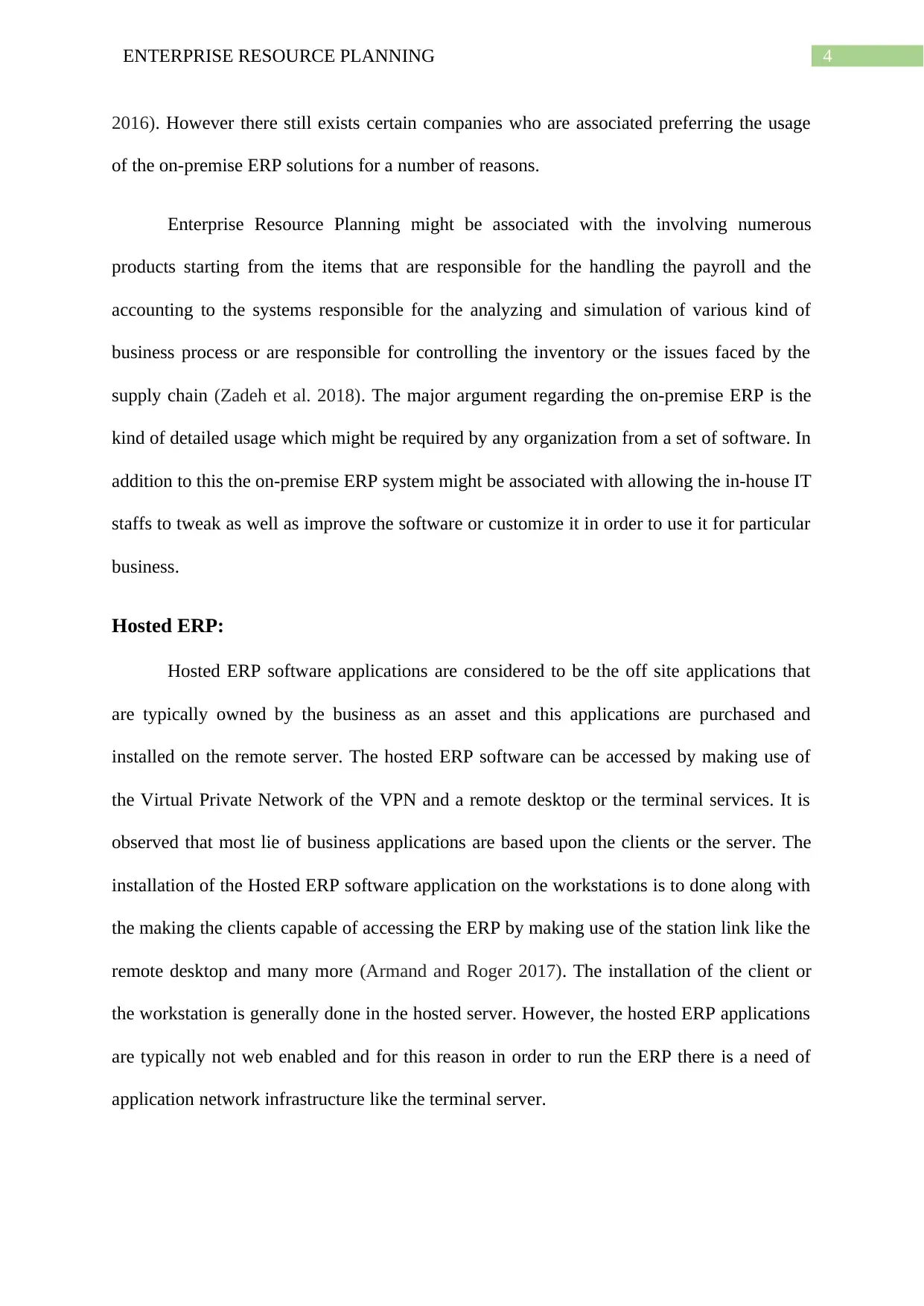
4ENTERPRISE RESOURCE PLANNING
2016). However there still exists certain companies who are associated preferring the usage
of the on-premise ERP solutions for a number of reasons.
Enterprise Resource Planning might be associated with the involving numerous
products starting from the items that are responsible for the handling the payroll and the
accounting to the systems responsible for the analyzing and simulation of various kind of
business process or are responsible for controlling the inventory or the issues faced by the
supply chain (Zadeh et al. 2018). The major argument regarding the on-premise ERP is the
kind of detailed usage which might be required by any organization from a set of software. In
addition to this the on-premise ERP system might be associated with allowing the in-house IT
staffs to tweak as well as improve the software or customize it in order to use it for particular
business.
Hosted ERP:
Hosted ERP software applications are considered to be the off site applications that
are typically owned by the business as an asset and this applications are purchased and
installed on the remote server. The hosted ERP software can be accessed by making use of
the Virtual Private Network of the VPN and a remote desktop or the terminal services. It is
observed that most lie of business applications are based upon the clients or the server. The
installation of the Hosted ERP software application on the workstations is to done along with
the making the clients capable of accessing the ERP by making use of the station link like the
remote desktop and many more (Armand and Roger 2017). The installation of the client or
the workstation is generally done in the hosted server. However, the hosted ERP applications
are typically not web enabled and for this reason in order to run the ERP there is a need of
application network infrastructure like the terminal server.
2016). However there still exists certain companies who are associated preferring the usage
of the on-premise ERP solutions for a number of reasons.
Enterprise Resource Planning might be associated with the involving numerous
products starting from the items that are responsible for the handling the payroll and the
accounting to the systems responsible for the analyzing and simulation of various kind of
business process or are responsible for controlling the inventory or the issues faced by the
supply chain (Zadeh et al. 2018). The major argument regarding the on-premise ERP is the
kind of detailed usage which might be required by any organization from a set of software. In
addition to this the on-premise ERP system might be associated with allowing the in-house IT
staffs to tweak as well as improve the software or customize it in order to use it for particular
business.
Hosted ERP:
Hosted ERP software applications are considered to be the off site applications that
are typically owned by the business as an asset and this applications are purchased and
installed on the remote server. The hosted ERP software can be accessed by making use of
the Virtual Private Network of the VPN and a remote desktop or the terminal services. It is
observed that most lie of business applications are based upon the clients or the server. The
installation of the Hosted ERP software application on the workstations is to done along with
the making the clients capable of accessing the ERP by making use of the station link like the
remote desktop and many more (Armand and Roger 2017). The installation of the client or
the workstation is generally done in the hosted server. However, the hosted ERP applications
are typically not web enabled and for this reason in order to run the ERP there is a need of
application network infrastructure like the terminal server.
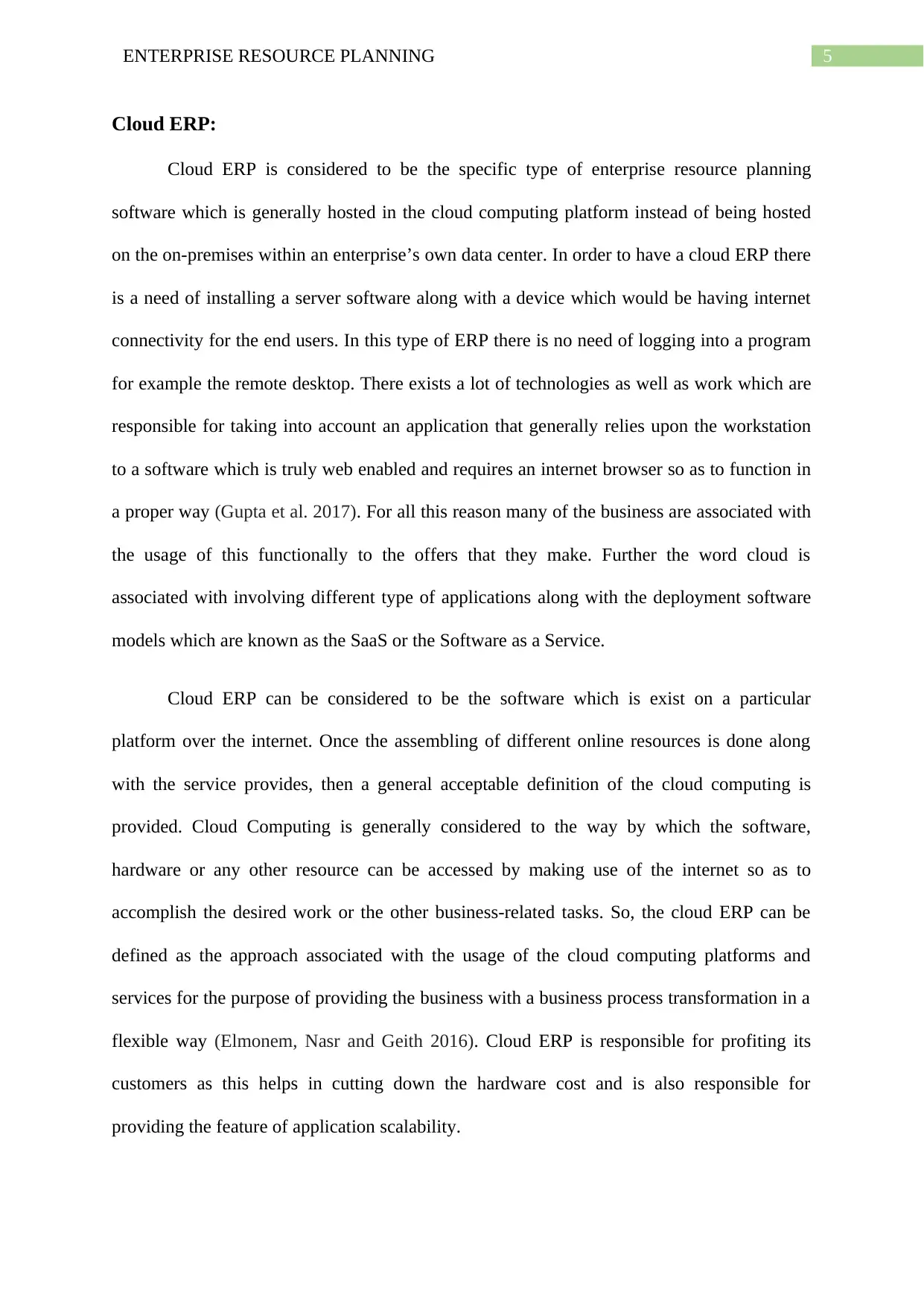
5ENTERPRISE RESOURCE PLANNING
Cloud ERP:
Cloud ERP is considered to be the specific type of enterprise resource planning
software which is generally hosted in the cloud computing platform instead of being hosted
on the on-premises within an enterprise’s own data center. In order to have a cloud ERP there
is a need of installing a server software along with a device which would be having internet
connectivity for the end users. In this type of ERP there is no need of logging into a program
for example the remote desktop. There exists a lot of technologies as well as work which are
responsible for taking into account an application that generally relies upon the workstation
to a software which is truly web enabled and requires an internet browser so as to function in
a proper way (Gupta et al. 2017). For all this reason many of the business are associated with
the usage of this functionally to the offers that they make. Further the word cloud is
associated with involving different type of applications along with the deployment software
models which are known as the SaaS or the Software as a Service.
Cloud ERP can be considered to be the software which is exist on a particular
platform over the internet. Once the assembling of different online resources is done along
with the service provides, then a general acceptable definition of the cloud computing is
provided. Cloud Computing is generally considered to the way by which the software,
hardware or any other resource can be accessed by making use of the internet so as to
accomplish the desired work or the other business-related tasks. So, the cloud ERP can be
defined as the approach associated with the usage of the cloud computing platforms and
services for the purpose of providing the business with a business process transformation in a
flexible way (Elmonem, Nasr and Geith 2016). Cloud ERP is responsible for profiting its
customers as this helps in cutting down the hardware cost and is also responsible for
providing the feature of application scalability.
Cloud ERP:
Cloud ERP is considered to be the specific type of enterprise resource planning
software which is generally hosted in the cloud computing platform instead of being hosted
on the on-premises within an enterprise’s own data center. In order to have a cloud ERP there
is a need of installing a server software along with a device which would be having internet
connectivity for the end users. In this type of ERP there is no need of logging into a program
for example the remote desktop. There exists a lot of technologies as well as work which are
responsible for taking into account an application that generally relies upon the workstation
to a software which is truly web enabled and requires an internet browser so as to function in
a proper way (Gupta et al. 2017). For all this reason many of the business are associated with
the usage of this functionally to the offers that they make. Further the word cloud is
associated with involving different type of applications along with the deployment software
models which are known as the SaaS or the Software as a Service.
Cloud ERP can be considered to be the software which is exist on a particular
platform over the internet. Once the assembling of different online resources is done along
with the service provides, then a general acceptable definition of the cloud computing is
provided. Cloud Computing is generally considered to the way by which the software,
hardware or any other resource can be accessed by making use of the internet so as to
accomplish the desired work or the other business-related tasks. So, the cloud ERP can be
defined as the approach associated with the usage of the cloud computing platforms and
services for the purpose of providing the business with a business process transformation in a
flexible way (Elmonem, Nasr and Geith 2016). Cloud ERP is responsible for profiting its
customers as this helps in cutting down the hardware cost and is also responsible for
providing the feature of application scalability.
⊘ This is a preview!⊘
Do you want full access?
Subscribe today to unlock all pages.

Trusted by 1+ million students worldwide
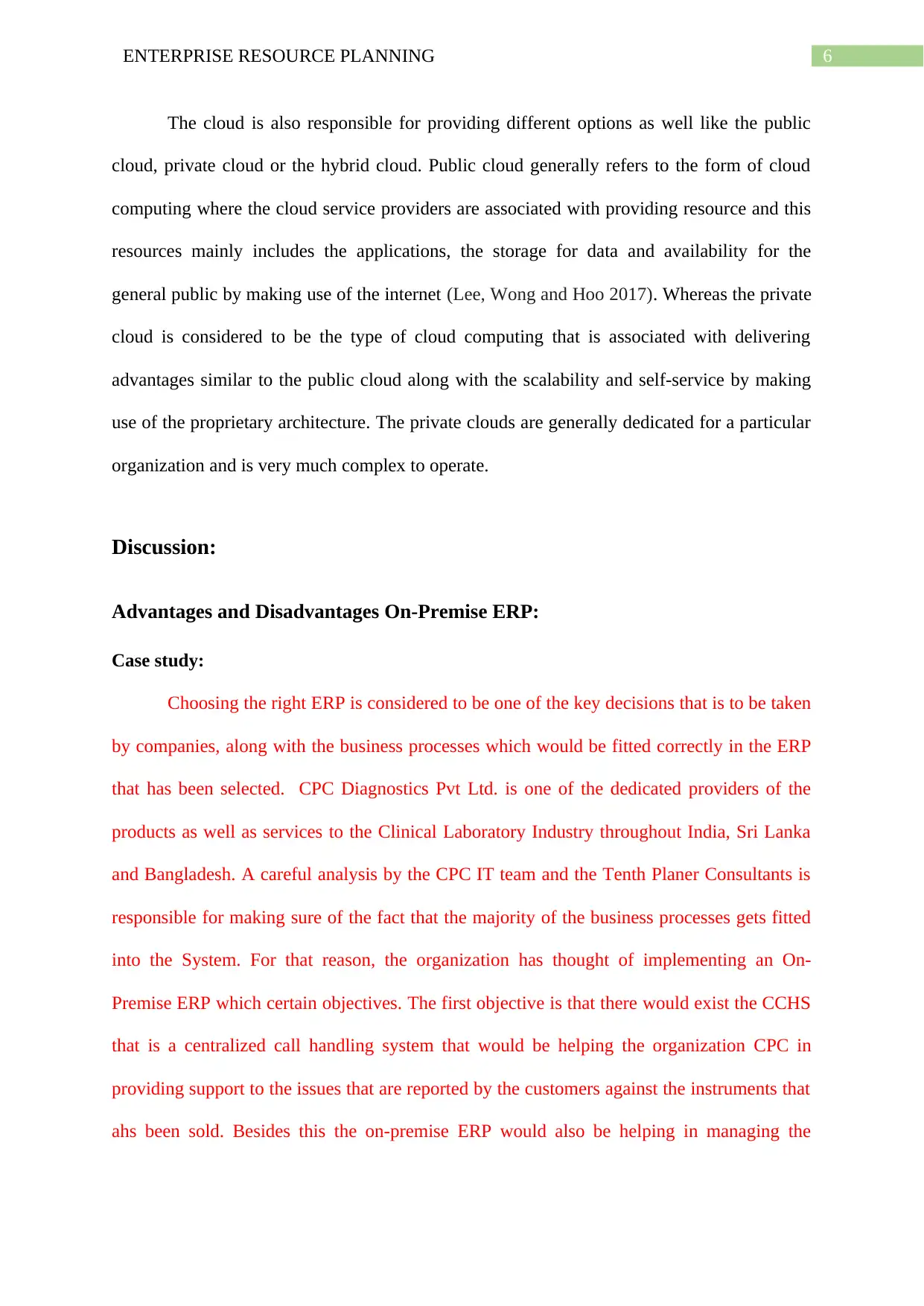
6ENTERPRISE RESOURCE PLANNING
The cloud is also responsible for providing different options as well like the public
cloud, private cloud or the hybrid cloud. Public cloud generally refers to the form of cloud
computing where the cloud service providers are associated with providing resource and this
resources mainly includes the applications, the storage for data and availability for the
general public by making use of the internet (Lee, Wong and Hoo 2017). Whereas the private
cloud is considered to be the type of cloud computing that is associated with delivering
advantages similar to the public cloud along with the scalability and self-service by making
use of the proprietary architecture. The private clouds are generally dedicated for a particular
organization and is very much complex to operate.
Discussion:
Advantages and Disadvantages On-Premise ERP:
Case study:
Choosing the right ERP is considered to be one of the key decisions that is to be taken
by companies, along with the business processes which would be fitted correctly in the ERP
that has been selected. CPC Diagnostics Pvt Ltd. is one of the dedicated providers of the
products as well as services to the Clinical Laboratory Industry throughout India, Sri Lanka
and Bangladesh. A careful analysis by the CPC IT team and the Tenth Planer Consultants is
responsible for making sure of the fact that the majority of the business processes gets fitted
into the System. For that reason, the organization has thought of implementing an On-
Premise ERP which certain objectives. The first objective is that there would exist the CCHS
that is a centralized call handling system that would be helping the organization CPC in
providing support to the issues that are reported by the customers against the instruments that
ahs been sold. Besides this the on-premise ERP would also be helping in managing the
The cloud is also responsible for providing different options as well like the public
cloud, private cloud or the hybrid cloud. Public cloud generally refers to the form of cloud
computing where the cloud service providers are associated with providing resource and this
resources mainly includes the applications, the storage for data and availability for the
general public by making use of the internet (Lee, Wong and Hoo 2017). Whereas the private
cloud is considered to be the type of cloud computing that is associated with delivering
advantages similar to the public cloud along with the scalability and self-service by making
use of the proprietary architecture. The private clouds are generally dedicated for a particular
organization and is very much complex to operate.
Discussion:
Advantages and Disadvantages On-Premise ERP:
Case study:
Choosing the right ERP is considered to be one of the key decisions that is to be taken
by companies, along with the business processes which would be fitted correctly in the ERP
that has been selected. CPC Diagnostics Pvt Ltd. is one of the dedicated providers of the
products as well as services to the Clinical Laboratory Industry throughout India, Sri Lanka
and Bangladesh. A careful analysis by the CPC IT team and the Tenth Planer Consultants is
responsible for making sure of the fact that the majority of the business processes gets fitted
into the System. For that reason, the organization has thought of implementing an On-
Premise ERP which certain objectives. The first objective is that there would exist the CCHS
that is a centralized call handling system that would be helping the organization CPC in
providing support to the issues that are reported by the customers against the instruments that
ahs been sold. Besides this the on-premise ERP would also be helping in managing the
Paraphrase This Document
Need a fresh take? Get an instant paraphrase of this document with our AI Paraphraser
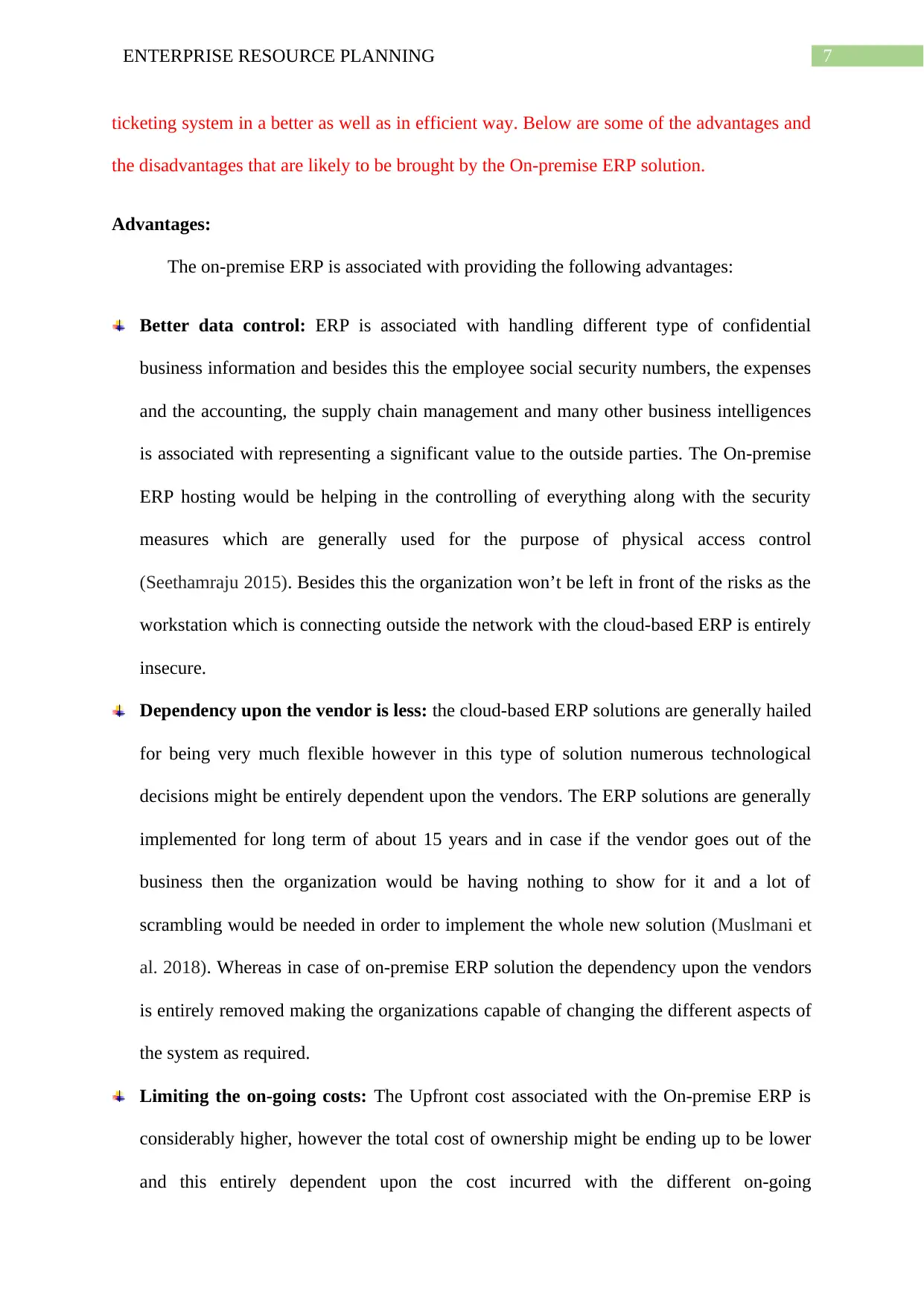
7ENTERPRISE RESOURCE PLANNING
ticketing system in a better as well as in efficient way. Below are some of the advantages and
the disadvantages that are likely to be brought by the On-premise ERP solution.
Advantages:
The on-premise ERP is associated with providing the following advantages:
Better data control: ERP is associated with handling different type of confidential
business information and besides this the employee social security numbers, the expenses
and the accounting, the supply chain management and many other business intelligences
is associated with representing a significant value to the outside parties. The On-premise
ERP hosting would be helping in the controlling of everything along with the security
measures which are generally used for the purpose of physical access control
(Seethamraju 2015). Besides this the organization won’t be left in front of the risks as the
workstation which is connecting outside the network with the cloud-based ERP is entirely
insecure.
Dependency upon the vendor is less: the cloud-based ERP solutions are generally hailed
for being very much flexible however in this type of solution numerous technological
decisions might be entirely dependent upon the vendors. The ERP solutions are generally
implemented for long term of about 15 years and in case if the vendor goes out of the
business then the organization would be having nothing to show for it and a lot of
scrambling would be needed in order to implement the whole new solution (Muslmani et
al. 2018). Whereas in case of on-premise ERP solution the dependency upon the vendors
is entirely removed making the organizations capable of changing the different aspects of
the system as required.
Limiting the on-going costs: The Upfront cost associated with the On-premise ERP is
considerably higher, however the total cost of ownership might be ending up to be lower
and this entirely dependent upon the cost incurred with the different on-going
ticketing system in a better as well as in efficient way. Below are some of the advantages and
the disadvantages that are likely to be brought by the On-premise ERP solution.
Advantages:
The on-premise ERP is associated with providing the following advantages:
Better data control: ERP is associated with handling different type of confidential
business information and besides this the employee social security numbers, the expenses
and the accounting, the supply chain management and many other business intelligences
is associated with representing a significant value to the outside parties. The On-premise
ERP hosting would be helping in the controlling of everything along with the security
measures which are generally used for the purpose of physical access control
(Seethamraju 2015). Besides this the organization won’t be left in front of the risks as the
workstation which is connecting outside the network with the cloud-based ERP is entirely
insecure.
Dependency upon the vendor is less: the cloud-based ERP solutions are generally hailed
for being very much flexible however in this type of solution numerous technological
decisions might be entirely dependent upon the vendors. The ERP solutions are generally
implemented for long term of about 15 years and in case if the vendor goes out of the
business then the organization would be having nothing to show for it and a lot of
scrambling would be needed in order to implement the whole new solution (Muslmani et
al. 2018). Whereas in case of on-premise ERP solution the dependency upon the vendors
is entirely removed making the organizations capable of changing the different aspects of
the system as required.
Limiting the on-going costs: The Upfront cost associated with the On-premise ERP is
considerably higher, however the total cost of ownership might be ending up to be lower
and this entirely dependent upon the cost incurred with the different on-going
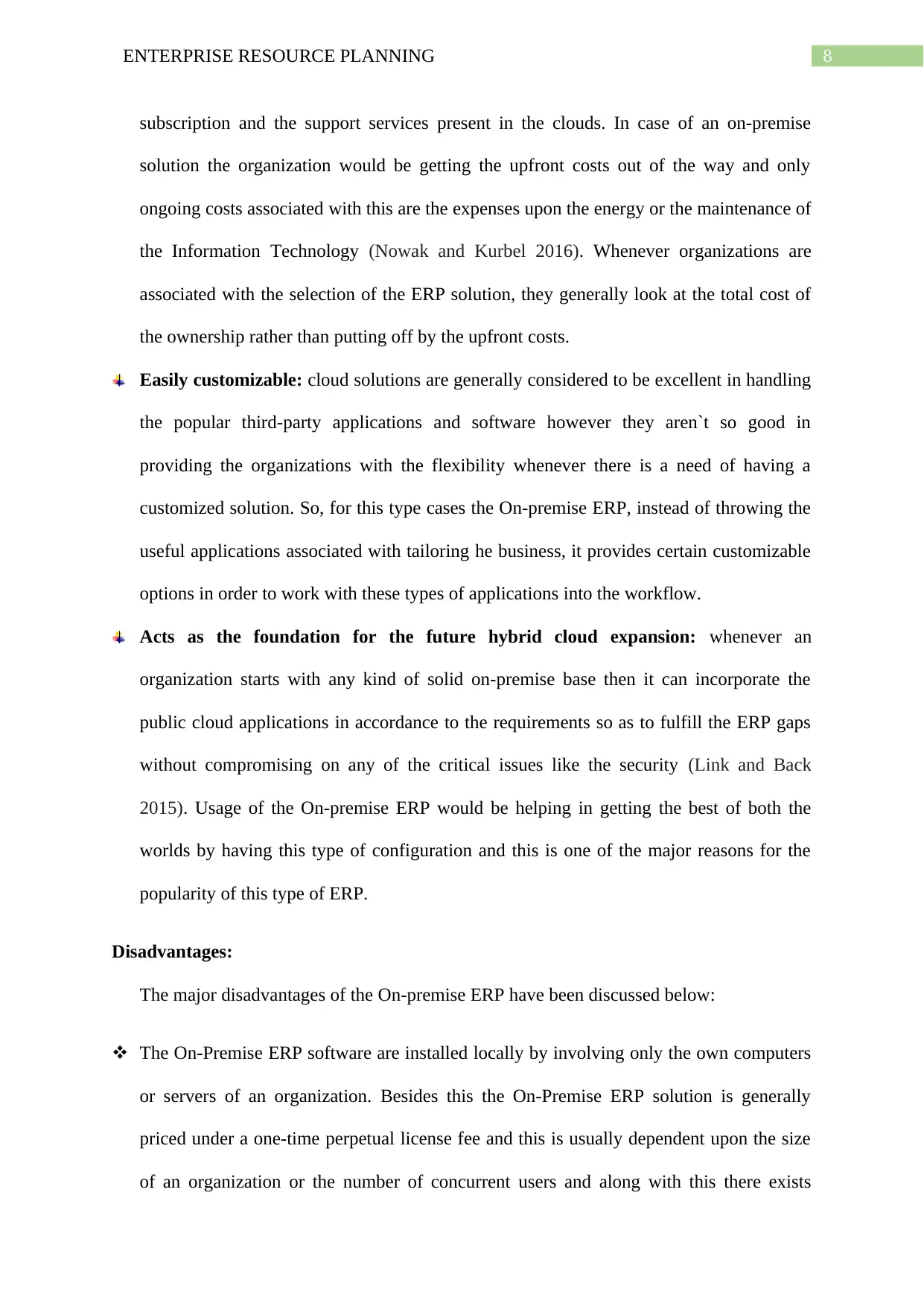
8ENTERPRISE RESOURCE PLANNING
subscription and the support services present in the clouds. In case of an on-premise
solution the organization would be getting the upfront costs out of the way and only
ongoing costs associated with this are the expenses upon the energy or the maintenance of
the Information Technology (Nowak and Kurbel 2016). Whenever organizations are
associated with the selection of the ERP solution, they generally look at the total cost of
the ownership rather than putting off by the upfront costs.
Easily customizable: cloud solutions are generally considered to be excellent in handling
the popular third-party applications and software however they aren`t so good in
providing the organizations with the flexibility whenever there is a need of having a
customized solution. So, for this type cases the On-premise ERP, instead of throwing the
useful applications associated with tailoring he business, it provides certain customizable
options in order to work with these types of applications into the workflow.
Acts as the foundation for the future hybrid cloud expansion: whenever an
organization starts with any kind of solid on-premise base then it can incorporate the
public cloud applications in accordance to the requirements so as to fulfill the ERP gaps
without compromising on any of the critical issues like the security (Link and Back
2015). Usage of the On-premise ERP would be helping in getting the best of both the
worlds by having this type of configuration and this is one of the major reasons for the
popularity of this type of ERP.
Disadvantages:
The major disadvantages of the On-premise ERP have been discussed below:
The On-Premise ERP software are installed locally by involving only the own computers
or servers of an organization. Besides this the On-Premise ERP solution is generally
priced under a one-time perpetual license fee and this is usually dependent upon the size
of an organization or the number of concurrent users and along with this there exists
subscription and the support services present in the clouds. In case of an on-premise
solution the organization would be getting the upfront costs out of the way and only
ongoing costs associated with this are the expenses upon the energy or the maintenance of
the Information Technology (Nowak and Kurbel 2016). Whenever organizations are
associated with the selection of the ERP solution, they generally look at the total cost of
the ownership rather than putting off by the upfront costs.
Easily customizable: cloud solutions are generally considered to be excellent in handling
the popular third-party applications and software however they aren`t so good in
providing the organizations with the flexibility whenever there is a need of having a
customized solution. So, for this type cases the On-premise ERP, instead of throwing the
useful applications associated with tailoring he business, it provides certain customizable
options in order to work with these types of applications into the workflow.
Acts as the foundation for the future hybrid cloud expansion: whenever an
organization starts with any kind of solid on-premise base then it can incorporate the
public cloud applications in accordance to the requirements so as to fulfill the ERP gaps
without compromising on any of the critical issues like the security (Link and Back
2015). Usage of the On-premise ERP would be helping in getting the best of both the
worlds by having this type of configuration and this is one of the major reasons for the
popularity of this type of ERP.
Disadvantages:
The major disadvantages of the On-premise ERP have been discussed below:
The On-Premise ERP software are installed locally by involving only the own computers
or servers of an organization. Besides this the On-Premise ERP solution is generally
priced under a one-time perpetual license fee and this is usually dependent upon the size
of an organization or the number of concurrent users and along with this there exists
⊘ This is a preview!⊘
Do you want full access?
Subscribe today to unlock all pages.

Trusted by 1+ million students worldwide
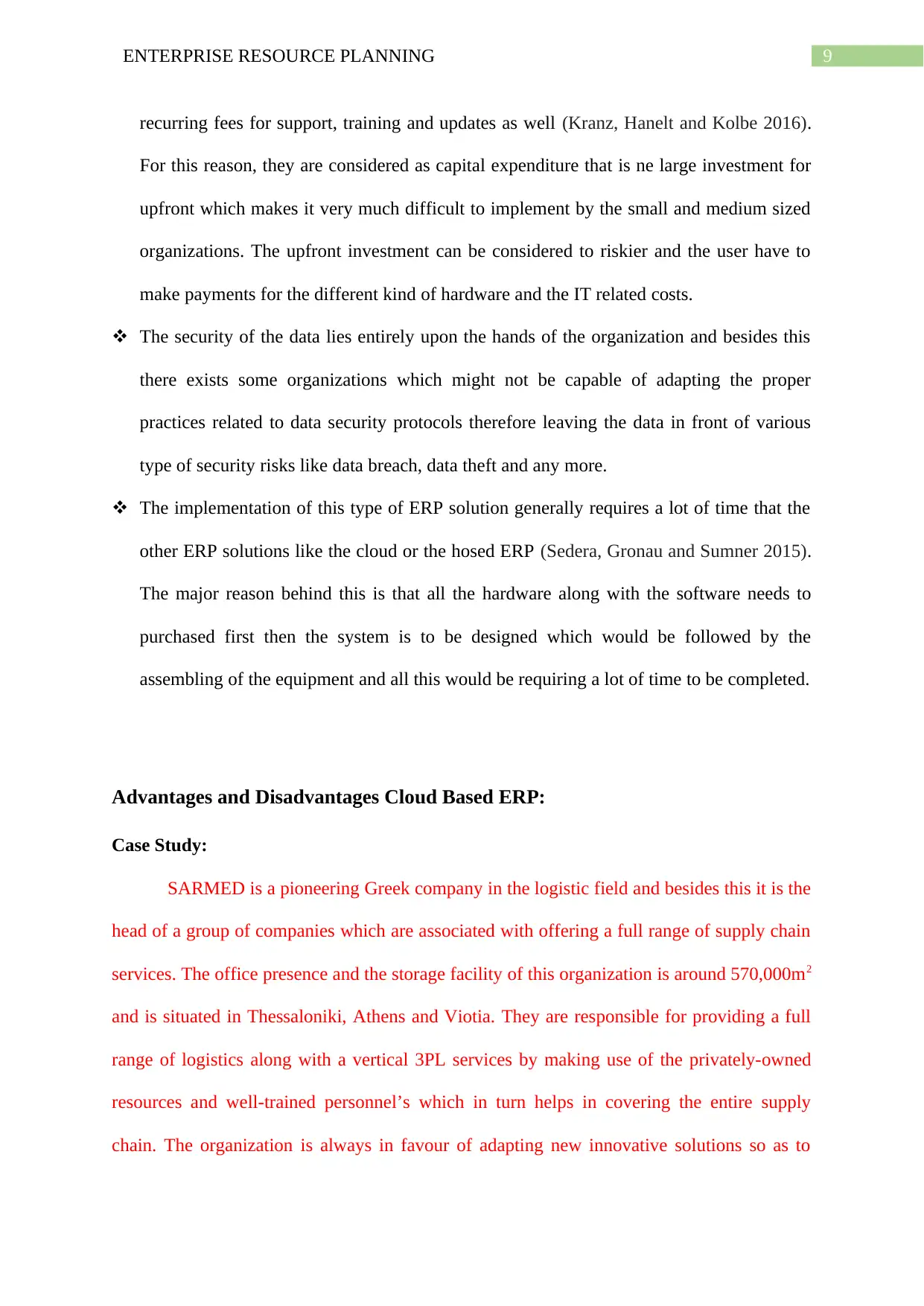
9ENTERPRISE RESOURCE PLANNING
recurring fees for support, training and updates as well (Kranz, Hanelt and Kolbe 2016).
For this reason, they are considered as capital expenditure that is ne large investment for
upfront which makes it very much difficult to implement by the small and medium sized
organizations. The upfront investment can be considered to riskier and the user have to
make payments for the different kind of hardware and the IT related costs.
The security of the data lies entirely upon the hands of the organization and besides this
there exists some organizations which might not be capable of adapting the proper
practices related to data security protocols therefore leaving the data in front of various
type of security risks like data breach, data theft and any more.
The implementation of this type of ERP solution generally requires a lot of time that the
other ERP solutions like the cloud or the hosed ERP (Sedera, Gronau and Sumner 2015).
The major reason behind this is that all the hardware along with the software needs to
purchased first then the system is to be designed which would be followed by the
assembling of the equipment and all this would be requiring a lot of time to be completed.
Advantages and Disadvantages Cloud Based ERP:
Case Study:
SARMED is a pioneering Greek company in the logistic field and besides this it is the
head of a group of companies which are associated with offering a full range of supply chain
services. The office presence and the storage facility of this organization is around 570,000m2
and is situated in Thessaloniki, Athens and Viotia. They are responsible for providing a full
range of logistics along with a vertical 3PL services by making use of the privately-owned
resources and well-trained personnel’s which in turn helps in covering the entire supply
chain. The organization is always in favour of adapting new innovative solutions so as to
recurring fees for support, training and updates as well (Kranz, Hanelt and Kolbe 2016).
For this reason, they are considered as capital expenditure that is ne large investment for
upfront which makes it very much difficult to implement by the small and medium sized
organizations. The upfront investment can be considered to riskier and the user have to
make payments for the different kind of hardware and the IT related costs.
The security of the data lies entirely upon the hands of the organization and besides this
there exists some organizations which might not be capable of adapting the proper
practices related to data security protocols therefore leaving the data in front of various
type of security risks like data breach, data theft and any more.
The implementation of this type of ERP solution generally requires a lot of time that the
other ERP solutions like the cloud or the hosed ERP (Sedera, Gronau and Sumner 2015).
The major reason behind this is that all the hardware along with the software needs to
purchased first then the system is to be designed which would be followed by the
assembling of the equipment and all this would be requiring a lot of time to be completed.
Advantages and Disadvantages Cloud Based ERP:
Case Study:
SARMED is a pioneering Greek company in the logistic field and besides this it is the
head of a group of companies which are associated with offering a full range of supply chain
services. The office presence and the storage facility of this organization is around 570,000m2
and is situated in Thessaloniki, Athens and Viotia. They are responsible for providing a full
range of logistics along with a vertical 3PL services by making use of the privately-owned
resources and well-trained personnel’s which in turn helps in covering the entire supply
chain. The organization is always in favour of adapting new innovative solutions so as to
Paraphrase This Document
Need a fresh take? Get an instant paraphrase of this document with our AI Paraphraser
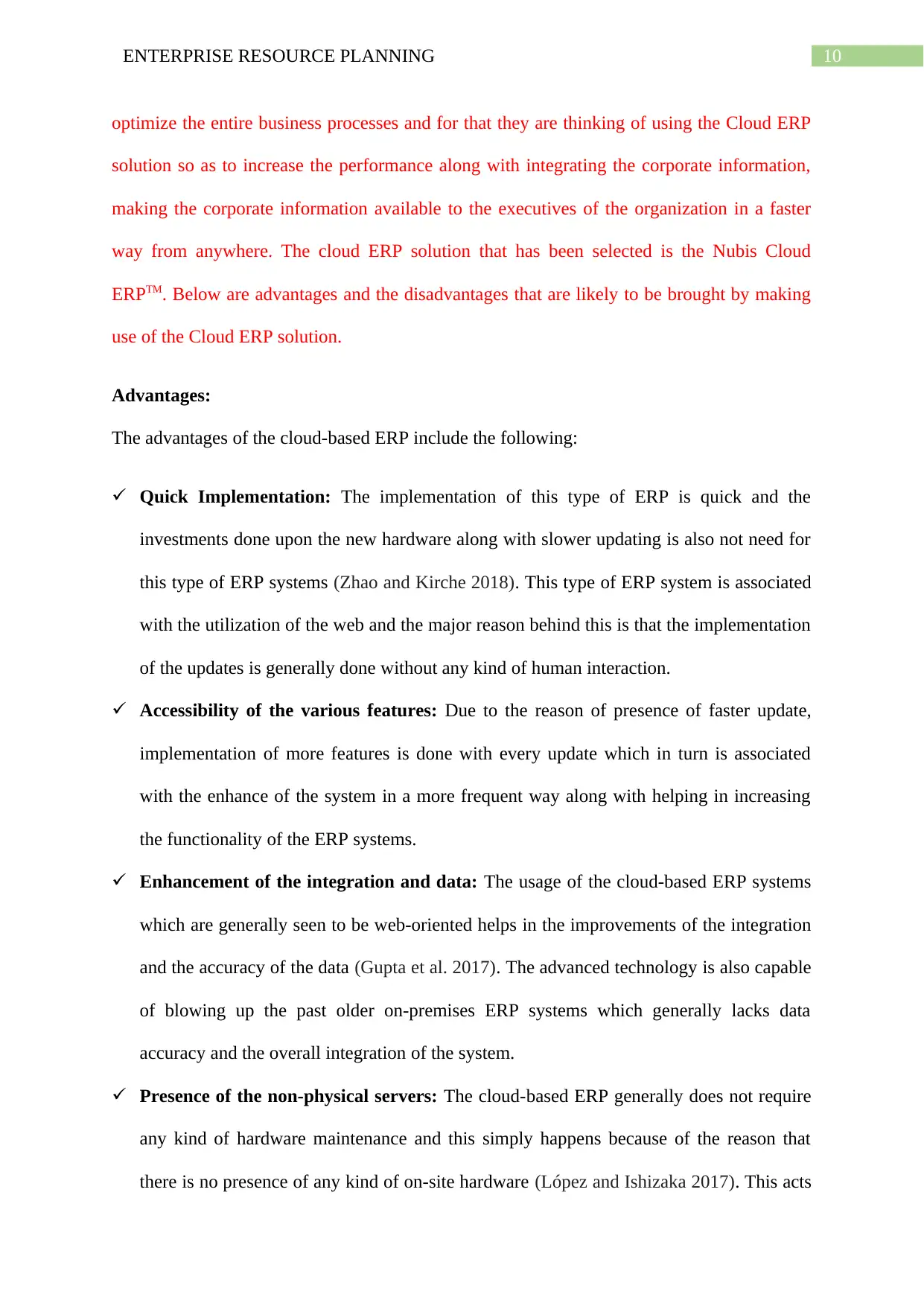
10ENTERPRISE RESOURCE PLANNING
optimize the entire business processes and for that they are thinking of using the Cloud ERP
solution so as to increase the performance along with integrating the corporate information,
making the corporate information available to the executives of the organization in a faster
way from anywhere. The cloud ERP solution that has been selected is the Nubis Cloud
ERPTM. Below are advantages and the disadvantages that are likely to be brought by making
use of the Cloud ERP solution.
Advantages:
The advantages of the cloud-based ERP include the following:
Quick Implementation: The implementation of this type of ERP is quick and the
investments done upon the new hardware along with slower updating is also not need for
this type of ERP systems (Zhao and Kirche 2018). This type of ERP system is associated
with the utilization of the web and the major reason behind this is that the implementation
of the updates is generally done without any kind of human interaction.
Accessibility of the various features: Due to the reason of presence of faster update,
implementation of more features is done with every update which in turn is associated
with the enhance of the system in a more frequent way along with helping in increasing
the functionality of the ERP systems.
Enhancement of the integration and data: The usage of the cloud-based ERP systems
which are generally seen to be web-oriented helps in the improvements of the integration
and the accuracy of the data (Gupta et al. 2017). The advanced technology is also capable
of blowing up the past older on-premises ERP systems which generally lacks data
accuracy and the overall integration of the system.
Presence of the non-physical servers: The cloud-based ERP generally does not require
any kind of hardware maintenance and this simply happens because of the reason that
there is no presence of any kind of on-site hardware (López and Ishizaka 2017). This acts
optimize the entire business processes and for that they are thinking of using the Cloud ERP
solution so as to increase the performance along with integrating the corporate information,
making the corporate information available to the executives of the organization in a faster
way from anywhere. The cloud ERP solution that has been selected is the Nubis Cloud
ERPTM. Below are advantages and the disadvantages that are likely to be brought by making
use of the Cloud ERP solution.
Advantages:
The advantages of the cloud-based ERP include the following:
Quick Implementation: The implementation of this type of ERP is quick and the
investments done upon the new hardware along with slower updating is also not need for
this type of ERP systems (Zhao and Kirche 2018). This type of ERP system is associated
with the utilization of the web and the major reason behind this is that the implementation
of the updates is generally done without any kind of human interaction.
Accessibility of the various features: Due to the reason of presence of faster update,
implementation of more features is done with every update which in turn is associated
with the enhance of the system in a more frequent way along with helping in increasing
the functionality of the ERP systems.
Enhancement of the integration and data: The usage of the cloud-based ERP systems
which are generally seen to be web-oriented helps in the improvements of the integration
and the accuracy of the data (Gupta et al. 2017). The advanced technology is also capable
of blowing up the past older on-premises ERP systems which generally lacks data
accuracy and the overall integration of the system.
Presence of the non-physical servers: The cloud-based ERP generally does not require
any kind of hardware maintenance and this simply happens because of the reason that
there is no presence of any kind of on-site hardware (López and Ishizaka 2017). This acts
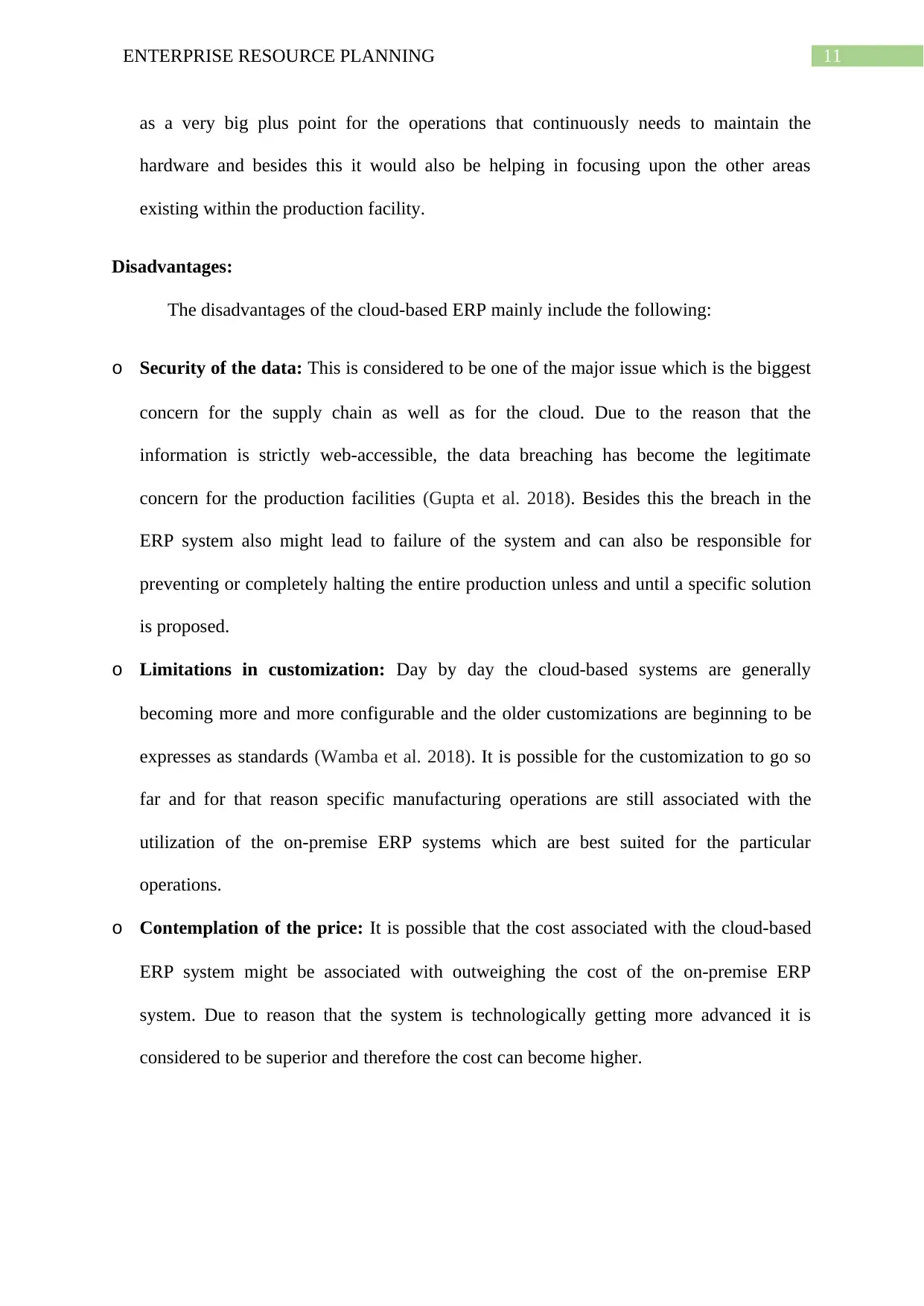
11ENTERPRISE RESOURCE PLANNING
as a very big plus point for the operations that continuously needs to maintain the
hardware and besides this it would also be helping in focusing upon the other areas
existing within the production facility.
Disadvantages:
The disadvantages of the cloud-based ERP mainly include the following:
o Security of the data: This is considered to be one of the major issue which is the biggest
concern for the supply chain as well as for the cloud. Due to the reason that the
information is strictly web-accessible, the data breaching has become the legitimate
concern for the production facilities (Gupta et al. 2018). Besides this the breach in the
ERP system also might lead to failure of the system and can also be responsible for
preventing or completely halting the entire production unless and until a specific solution
is proposed.
o Limitations in customization: Day by day the cloud-based systems are generally
becoming more and more configurable and the older customizations are beginning to be
expresses as standards (Wamba et al. 2018). It is possible for the customization to go so
far and for that reason specific manufacturing operations are still associated with the
utilization of the on-premise ERP systems which are best suited for the particular
operations.
o Contemplation of the price: It is possible that the cost associated with the cloud-based
ERP system might be associated with outweighing the cost of the on-premise ERP
system. Due to reason that the system is technologically getting more advanced it is
considered to be superior and therefore the cost can become higher.
as a very big plus point for the operations that continuously needs to maintain the
hardware and besides this it would also be helping in focusing upon the other areas
existing within the production facility.
Disadvantages:
The disadvantages of the cloud-based ERP mainly include the following:
o Security of the data: This is considered to be one of the major issue which is the biggest
concern for the supply chain as well as for the cloud. Due to the reason that the
information is strictly web-accessible, the data breaching has become the legitimate
concern for the production facilities (Gupta et al. 2018). Besides this the breach in the
ERP system also might lead to failure of the system and can also be responsible for
preventing or completely halting the entire production unless and until a specific solution
is proposed.
o Limitations in customization: Day by day the cloud-based systems are generally
becoming more and more configurable and the older customizations are beginning to be
expresses as standards (Wamba et al. 2018). It is possible for the customization to go so
far and for that reason specific manufacturing operations are still associated with the
utilization of the on-premise ERP systems which are best suited for the particular
operations.
o Contemplation of the price: It is possible that the cost associated with the cloud-based
ERP system might be associated with outweighing the cost of the on-premise ERP
system. Due to reason that the system is technologically getting more advanced it is
considered to be superior and therefore the cost can become higher.
⊘ This is a preview!⊘
Do you want full access?
Subscribe today to unlock all pages.

Trusted by 1+ million students worldwide
1 out of 21
Related Documents
Your All-in-One AI-Powered Toolkit for Academic Success.
+13062052269
info@desklib.com
Available 24*7 on WhatsApp / Email
![[object Object]](/_next/static/media/star-bottom.7253800d.svg)
Unlock your academic potential
Copyright © 2020–2026 A2Z Services. All Rights Reserved. Developed and managed by ZUCOL.



